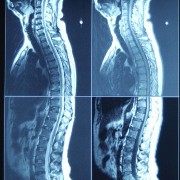The vertebrae in your back are cushioned by small, spongy discs. When healthy and in good working order, they are like shock absorbers for your spine, helping to keep it flexible. When a disc sustains damage, however, it may bulge or even break open. In medical terms, this is referred to as a herniated disc, a slipped disc or a ruptured disc.
While herniated discs may present in any area of the spine, most of them occur in the lower back, or the lumbar region. Some do happen in the neck (cervical) area. However, the upper back (thoracic spine) is rarely affected by a herniated disc.
There are a variety of factors that may contribute to a herniated disc. Simple wear and tear can cause a disc to slip. As we age, our discs begin to dry out and lose their flexibility. If you suffer an injury to the spine, this can cause tiny tears or cracks in the outer layer of the disc, thus causing the gel inside of the disc to be forced out through the tears or cracks. This is what makes the disc bulge, break open or even break into several pieces.
Pain or numbness in the area may occur when the herniated disc presses on nerve roots. You may experience weakness in the area of the body where the particular pressed nerve travels. For example, a herniated disc in the lower back can created pain and numbness in the buttocks and down the leg. This is known as sciatica and is a common symptom of a herniated disc located in the lower back.
If you begin to notice any weakness or numbness in both legs, accompanied by a loss of control over bladder and bowel functions, then medical care must be immediately obtained. This could potentially be a sign of a serious, albeit rare, condition called cauda equina syndrome.
It may take just a few weeks or up to several months before the symptoms of a herniated disc improve. There are certain measures you can undertake to help facilitate the recovery process, such as getting rest if the pain is severe. In the absence of intense pain, it is best to stay active so your muscles do not weaken, exacerbating the problem. Walking may help tremendously.
A heating pad applied at a low or medium setting for 15-20 minutes every two to three hours can help, as can a warm shower. Trying an ice pack for 10-15 minutes every two to three hours is also beneficial. Your doctor or physical therapist may suggest certain exercises to do to keep your back muscles strong and to reduce further injury. While medicine will not cure a herniated disc, it may help with the pain and swelling. Be sure to inquire of your doctor about that particular measure.
Herniated discs typically heal on their own over a period of time. About half of people who have a herniated disc show signs of improvement in a month. Most are nearly recovered in six months. Statistics show that only one in ten people have to resort to surgical intervention to treat the problem. The trick is to remain patient and to stick with your plan of treatment.
Once you have injured your back, you are more susceptible to future back problems, so learn to keep your back healthy. Use proper techniques of lifting things up off the ground. Lift with your legs, not with your back. Bend at the knees and squat. Do not bend at the waist.
Make sure you employ good posture. When standing or walking, hold your shoulders back and down, keep your chin back, and suck in that belly! All of these tiny efforts will help to support your lower back. Regular exercise and maintaining a healthy weight are also important. Too much weight can put an extra load on your back. Even smoking increases the risk of a disc injury, so, if you do smoke, this is incentive to kick the habit!
(Information for this article was found at http://www.aolhelath.com/conditions/herniated-disc-major-1?flv=1#)




Add a CommentComments
There are no comments yet. Be the first one and get the conversation started!